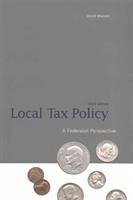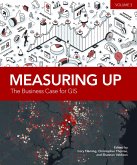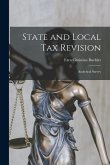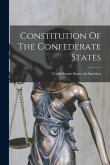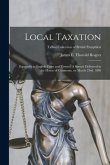David Brunori
Local Tax Policy
Andere Kunden interessierten sich auch für
![Measuring Up Measuring Up]() Measuring Up30,99 €
Measuring Up30,99 €![The Mayor and The Judge The Mayor and The Judge]() Judge Nelson W WolffThe Mayor and The Judge18,99 €
Judge Nelson W WolffThe Mayor and The Judge18,99 €![State and Local Tax Revision State and Local Tax Revision]() Ezra Christian BuehlerState and Local Tax Revision21,99 €
Ezra Christian BuehlerState and Local Tax Revision21,99 €![Constitution Of The Confederate States Constitution Of The Confederate States]() Constitution Of The Confederate States16,99 €
Constitution Of The Confederate States16,99 €![Reports Relative to Valuation for Poor Rates, and to Registered Elective Franchise in Ireland: (local Reports) (first Series, Part II); Second General Reports Relative to Valuation for Poor Rates, and to Registered Elective Franchise in Ireland: (local Reports) (first Series, Part II); Second General]() AnonymousReports Relative to Valuation for Poor Rates, and to Registered Elective Franchise in Ireland: (local Reports) (first Series, Part II); Second General19,99 €
AnonymousReports Relative to Valuation for Poor Rates, and to Registered Elective Franchise in Ireland: (local Reports) (first Series, Part II); Second General19,99 €![Local Taxation: Especially in English Cities and Towns: A Speech Delivered in the House of Commons, on March 23rd, 1886; Talbot Collec Local Taxation: Especially in English Cities and Towns: A Speech Delivered in the House of Commons, on March 23rd, 1886; Talbot Collec]() Local Taxation: Especially in English Cities and Towns: A Speech Delivered in the House of Commons, on March 23rd, 1886; Talbot Collec15,99 €
Local Taxation: Especially in English Cities and Towns: A Speech Delivered in the House of Commons, on March 23rd, 1886; Talbot Collec15,99 €![Tax Policy and the Macroeconomy: Stabilization, Growth, and Income Distribution: Scheduled for Hearings Before the House Committee on Ways and Means o Tax Policy and the Macroeconomy: Stabilization, Growth, and Income Distribution: Scheduled for Hearings Before the House Committee on Ways and Means o]() Tax Policy and the Macroeconomy: Stabilization, Growth, and Income Distribution: Scheduled for Hearings Before the House Committee on Ways and Means o17,99 €
Tax Policy and the Macroeconomy: Stabilization, Growth, and Income Distribution: Scheduled for Hearings Before the House Committee on Ways and Means o17,99 €-
-
-
Produktdetails
- Verlag: Globe Pequot Publishing Group Inc/Bloomsbury
- UK edition
- Seitenzahl: 182
- Erscheinungstermin: 3. Februar 2014
- Englisch
- Abmessung: 226mm x 152mm x 13mm
- Gewicht: 340g
- ISBN-13: 9780877667803
- ISBN-10: 0877667802
- Artikelnr.: 44515534
Hinweis: Dieser Artikel kann nur an eine deutsche Lieferadresse ausgeliefert werden.
- Herstellerkennzeichnung
- Libri GmbH
- Europaallee 1
- 36244 Bad Hersfeld
- gpsr@libri.de
David Brunori is a journalist, author, educator, and lawyer who specializes in tax and government issues. He is the Deputy Publisher at Tax Analysts. In addition he serves as contributing editor to State Tax Notes magazine for which he writes the Politics of State Taxation, a weekly column focusing on state and local tax and budget politics. He is a Research Professor at the Trachtenberg School of Public Policy and Public Administration at The George Washington University where he teaches courses in state and local public finance and fiscal federalism. He also teaches state and local tax law at the George Washington University Law School. He has published numerous books and articles on state and local tax policy.
Chapter 1: Local Tax Policy Localism as a Normative Good Political and
Economic Constraints on Localism The Logic of the Property Tax A Good Tax
under Siege There Are No Alternatives to Taxing Policy Raising Revenue in
the Modern Economy Possible Solutions Chapter Two: Local Taxation and
American Federalism The Logic of Localism Economic Efficiencies Political
Virtues Localism and Taxing Authority Fiscal Autonomy under Siege Chapter
Three: Local Limits The Politics of Taxation Political Imperatives Provide
Services Create Wealth Avoid Redistribution Political Biases Tax
Competition Exporting the Tax Burden Raising Revenue in an Era of
Antitaxation Building a Sound Local Tax System Chapter 4: The Logic of the
PropertyTax Property Taxation in the United States Virtues of the Property
Tax An Old Tax A Stable Tax An Easy-to-Administer Tax A Benefits Tax A Tax
that Allows Control A Visible Tax Chapter 5: The Property Tax under Siege
Public Unhappiness Visibility Unfair Administration Shifting Property Tax
Burdens Consequences of Public Dissatisfaction Tax Limitations A
Proliferation of Exemptions Economic Development Exemptions Charitable
Exemptions Farm Relief Government Property Tax Relief Measures Homestead
Exemptions Homestead Credits and Circuit Breakers Property Tax Deferrals
The Case of School Finance Chapter 6: Local-Option Sales and Excise Taxes
Local-Option Sales Taxes Policy Reasons for Imposing Local-Option Sales
Taxes Promotion of Local Autonomy Administrative Efficiency Diversification
of the Tax Base Public Acceptance Problems with Local-Option Sales Taxes
Shrinking Tax Base Interjurisdiction Competition Regressivity Reduced State
Flexibility Fiscal Disparities Outlook for Local-Option Sales Taxes
Local-Option Excise Taxes Lodging Taxes Meals Taxes Fuel Excise Taxes
Local-Option Real Estate Transfer Taxes Local-Option Tobacco Taxes Chapter
7: Income and Business Taxes Local-Option Income and Wage Taxes Policy
Issues around Taxing Income and Wages Visibility and Accountability
Economic Efficiency Revenue Growth and Diversification Fairness Fiscal
Disparities Taxing Commuters or Exporting Tax Burdens Intergovernmental
Issues Political Bias Outlook Local-Option Business Taxes Local-Option
Business Income Taxes Gross Receipts/License Taxes Business Personal
Property Taxes Payroll Taxes Outlook for Business Taxes Chapter 8: Nontax
Revenue Options Intergovernmental Aid Policy Justifications for
Intergovernmental Aid Problems with Intergovernmental Aid Unreliability
Less Autonomy Efficiency Consequences for Local Tax Policy User Fees and
Charges Policy Reasons for Imposing Charges Economic Efficiency
Diversification of Revenue Sources Local Control Problems with Imposing
Charges Limitations on Revenue Growth Fairness Concerns Outlook for User
Fees Utilities and Other Service-for-Fee Enterprises Chapter 9: Financing
Local Government in a Global Economy Globalism Technological Advances
Deregulation An Aging Population Tax Policy in the New Economy Chapter 10:
A Blueprint for Strengthening Property Tax Challenges to Local Tax Policy
and Political Autonomy Recommendations for Strengthening Local Tax Autonomy
Educate the Public on the Virtues of the Property Tax Ease the Excesses of
the Property Tax Revolts Protect and Expand the Property Tax Base Address
the Problems of School Finance Equalization
Economic Constraints on Localism The Logic of the Property Tax A Good Tax
under Siege There Are No Alternatives to Taxing Policy Raising Revenue in
the Modern Economy Possible Solutions Chapter Two: Local Taxation and
American Federalism The Logic of Localism Economic Efficiencies Political
Virtues Localism and Taxing Authority Fiscal Autonomy under Siege Chapter
Three: Local Limits The Politics of Taxation Political Imperatives Provide
Services Create Wealth Avoid Redistribution Political Biases Tax
Competition Exporting the Tax Burden Raising Revenue in an Era of
Antitaxation Building a Sound Local Tax System Chapter 4: The Logic of the
PropertyTax Property Taxation in the United States Virtues of the Property
Tax An Old Tax A Stable Tax An Easy-to-Administer Tax A Benefits Tax A Tax
that Allows Control A Visible Tax Chapter 5: The Property Tax under Siege
Public Unhappiness Visibility Unfair Administration Shifting Property Tax
Burdens Consequences of Public Dissatisfaction Tax Limitations A
Proliferation of Exemptions Economic Development Exemptions Charitable
Exemptions Farm Relief Government Property Tax Relief Measures Homestead
Exemptions Homestead Credits and Circuit Breakers Property Tax Deferrals
The Case of School Finance Chapter 6: Local-Option Sales and Excise Taxes
Local-Option Sales Taxes Policy Reasons for Imposing Local-Option Sales
Taxes Promotion of Local Autonomy Administrative Efficiency Diversification
of the Tax Base Public Acceptance Problems with Local-Option Sales Taxes
Shrinking Tax Base Interjurisdiction Competition Regressivity Reduced State
Flexibility Fiscal Disparities Outlook for Local-Option Sales Taxes
Local-Option Excise Taxes Lodging Taxes Meals Taxes Fuel Excise Taxes
Local-Option Real Estate Transfer Taxes Local-Option Tobacco Taxes Chapter
7: Income and Business Taxes Local-Option Income and Wage Taxes Policy
Issues around Taxing Income and Wages Visibility and Accountability
Economic Efficiency Revenue Growth and Diversification Fairness Fiscal
Disparities Taxing Commuters or Exporting Tax Burdens Intergovernmental
Issues Political Bias Outlook Local-Option Business Taxes Local-Option
Business Income Taxes Gross Receipts/License Taxes Business Personal
Property Taxes Payroll Taxes Outlook for Business Taxes Chapter 8: Nontax
Revenue Options Intergovernmental Aid Policy Justifications for
Intergovernmental Aid Problems with Intergovernmental Aid Unreliability
Less Autonomy Efficiency Consequences for Local Tax Policy User Fees and
Charges Policy Reasons for Imposing Charges Economic Efficiency
Diversification of Revenue Sources Local Control Problems with Imposing
Charges Limitations on Revenue Growth Fairness Concerns Outlook for User
Fees Utilities and Other Service-for-Fee Enterprises Chapter 9: Financing
Local Government in a Global Economy Globalism Technological Advances
Deregulation An Aging Population Tax Policy in the New Economy Chapter 10:
A Blueprint for Strengthening Property Tax Challenges to Local Tax Policy
and Political Autonomy Recommendations for Strengthening Local Tax Autonomy
Educate the Public on the Virtues of the Property Tax Ease the Excesses of
the Property Tax Revolts Protect and Expand the Property Tax Base Address
the Problems of School Finance Equalization
Chapter 1: Local Tax Policy Localism as a Normative Good Political and
Economic Constraints on Localism The Logic of the Property Tax A Good Tax
under Siege There Are No Alternatives to Taxing Policy Raising Revenue in
the Modern Economy Possible Solutions Chapter Two: Local Taxation and
American Federalism The Logic of Localism Economic Efficiencies Political
Virtues Localism and Taxing Authority Fiscal Autonomy under Siege Chapter
Three: Local Limits The Politics of Taxation Political Imperatives Provide
Services Create Wealth Avoid Redistribution Political Biases Tax
Competition Exporting the Tax Burden Raising Revenue in an Era of
Antitaxation Building a Sound Local Tax System Chapter 4: The Logic of the
PropertyTax Property Taxation in the United States Virtues of the Property
Tax An Old Tax A Stable Tax An Easy-to-Administer Tax A Benefits Tax A Tax
that Allows Control A Visible Tax Chapter 5: The Property Tax under Siege
Public Unhappiness Visibility Unfair Administration Shifting Property Tax
Burdens Consequences of Public Dissatisfaction Tax Limitations A
Proliferation of Exemptions Economic Development Exemptions Charitable
Exemptions Farm Relief Government Property Tax Relief Measures Homestead
Exemptions Homestead Credits and Circuit Breakers Property Tax Deferrals
The Case of School Finance Chapter 6: Local-Option Sales and Excise Taxes
Local-Option Sales Taxes Policy Reasons for Imposing Local-Option Sales
Taxes Promotion of Local Autonomy Administrative Efficiency Diversification
of the Tax Base Public Acceptance Problems with Local-Option Sales Taxes
Shrinking Tax Base Interjurisdiction Competition Regressivity Reduced State
Flexibility Fiscal Disparities Outlook for Local-Option Sales Taxes
Local-Option Excise Taxes Lodging Taxes Meals Taxes Fuel Excise Taxes
Local-Option Real Estate Transfer Taxes Local-Option Tobacco Taxes Chapter
7: Income and Business Taxes Local-Option Income and Wage Taxes Policy
Issues around Taxing Income and Wages Visibility and Accountability
Economic Efficiency Revenue Growth and Diversification Fairness Fiscal
Disparities Taxing Commuters or Exporting Tax Burdens Intergovernmental
Issues Political Bias Outlook Local-Option Business Taxes Local-Option
Business Income Taxes Gross Receipts/License Taxes Business Personal
Property Taxes Payroll Taxes Outlook for Business Taxes Chapter 8: Nontax
Revenue Options Intergovernmental Aid Policy Justifications for
Intergovernmental Aid Problems with Intergovernmental Aid Unreliability
Less Autonomy Efficiency Consequences for Local Tax Policy User Fees and
Charges Policy Reasons for Imposing Charges Economic Efficiency
Diversification of Revenue Sources Local Control Problems with Imposing
Charges Limitations on Revenue Growth Fairness Concerns Outlook for User
Fees Utilities and Other Service-for-Fee Enterprises Chapter 9: Financing
Local Government in a Global Economy Globalism Technological Advances
Deregulation An Aging Population Tax Policy in the New Economy Chapter 10:
A Blueprint for Strengthening Property Tax Challenges to Local Tax Policy
and Political Autonomy Recommendations for Strengthening Local Tax Autonomy
Educate the Public on the Virtues of the Property Tax Ease the Excesses of
the Property Tax Revolts Protect and Expand the Property Tax Base Address
the Problems of School Finance Equalization
Economic Constraints on Localism The Logic of the Property Tax A Good Tax
under Siege There Are No Alternatives to Taxing Policy Raising Revenue in
the Modern Economy Possible Solutions Chapter Two: Local Taxation and
American Federalism The Logic of Localism Economic Efficiencies Political
Virtues Localism and Taxing Authority Fiscal Autonomy under Siege Chapter
Three: Local Limits The Politics of Taxation Political Imperatives Provide
Services Create Wealth Avoid Redistribution Political Biases Tax
Competition Exporting the Tax Burden Raising Revenue in an Era of
Antitaxation Building a Sound Local Tax System Chapter 4: The Logic of the
PropertyTax Property Taxation in the United States Virtues of the Property
Tax An Old Tax A Stable Tax An Easy-to-Administer Tax A Benefits Tax A Tax
that Allows Control A Visible Tax Chapter 5: The Property Tax under Siege
Public Unhappiness Visibility Unfair Administration Shifting Property Tax
Burdens Consequences of Public Dissatisfaction Tax Limitations A
Proliferation of Exemptions Economic Development Exemptions Charitable
Exemptions Farm Relief Government Property Tax Relief Measures Homestead
Exemptions Homestead Credits and Circuit Breakers Property Tax Deferrals
The Case of School Finance Chapter 6: Local-Option Sales and Excise Taxes
Local-Option Sales Taxes Policy Reasons for Imposing Local-Option Sales
Taxes Promotion of Local Autonomy Administrative Efficiency Diversification
of the Tax Base Public Acceptance Problems with Local-Option Sales Taxes
Shrinking Tax Base Interjurisdiction Competition Regressivity Reduced State
Flexibility Fiscal Disparities Outlook for Local-Option Sales Taxes
Local-Option Excise Taxes Lodging Taxes Meals Taxes Fuel Excise Taxes
Local-Option Real Estate Transfer Taxes Local-Option Tobacco Taxes Chapter
7: Income and Business Taxes Local-Option Income and Wage Taxes Policy
Issues around Taxing Income and Wages Visibility and Accountability
Economic Efficiency Revenue Growth and Diversification Fairness Fiscal
Disparities Taxing Commuters or Exporting Tax Burdens Intergovernmental
Issues Political Bias Outlook Local-Option Business Taxes Local-Option
Business Income Taxes Gross Receipts/License Taxes Business Personal
Property Taxes Payroll Taxes Outlook for Business Taxes Chapter 8: Nontax
Revenue Options Intergovernmental Aid Policy Justifications for
Intergovernmental Aid Problems with Intergovernmental Aid Unreliability
Less Autonomy Efficiency Consequences for Local Tax Policy User Fees and
Charges Policy Reasons for Imposing Charges Economic Efficiency
Diversification of Revenue Sources Local Control Problems with Imposing
Charges Limitations on Revenue Growth Fairness Concerns Outlook for User
Fees Utilities and Other Service-for-Fee Enterprises Chapter 9: Financing
Local Government in a Global Economy Globalism Technological Advances
Deregulation An Aging Population Tax Policy in the New Economy Chapter 10:
A Blueprint for Strengthening Property Tax Challenges to Local Tax Policy
and Political Autonomy Recommendations for Strengthening Local Tax Autonomy
Educate the Public on the Virtues of the Property Tax Ease the Excesses of
the Property Tax Revolts Protect and Expand the Property Tax Base Address
the Problems of School Finance Equalization

